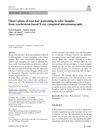 July 2023 in “bioRxiv (Cold Spring Harbor Laboratory)”
July 2023 in “bioRxiv (Cold Spring Harbor Laboratory)” Chitosan slows root hair growth and causes a buildup of callose at low concentrations, but at high concentrations, it only inhibits growth without callose buildup.
43 citations,
December 2017 in “BMC Plant Biology” GmMAX3b gene in soybeans boosts nodulation and affects hormone levels.
 22 citations,
August 2019 in “Environmental research”
22 citations,
August 2019 in “Environmental research” Pseudomonas sp. T5-6-I bacteria increase selenium uptake in Brassica oleracea plants by 130%.
 May 2024 in “Physiologia Plantarum”
May 2024 in “Physiologia Plantarum” Bacillus subtilis helps plants get more phosphorus and grow better roots.
 December 2022 in “Journal of Experimental Biology and Agricultural Sciences”
December 2022 in “Journal of Experimental Biology and Agricultural Sciences” Using certain plant growth regulators together improves the cloning of the medicinal plant Eclipta alba.
 January 2024 in “Frontiers in plant science”
January 2024 in “Frontiers in plant science” The zinc finger protein 3 in Arabidopsis thaliana reduces plant growth and root hair development.
17 citations,
July 2018 in “Environmental and Experimental Botany” Silencing NtNCED3-2 gene in tobacco reduces drought tolerance and impairs growth.
 1 citations,
September 2023 in “Molecules (Basel. Online)”
1 citations,
September 2023 in “Molecules (Basel. Online)” Plant sterols have health benefits like lowering cholesterol, but more research is needed to understand their effects and improve their extraction and sustainability.
 July 2024 in “International Journal of Molecular Sciences”
July 2024 in “International Journal of Molecular Sciences” Hemp seed biomaterials may reduce hair loss and improve hair growth.
 161 citations,
August 2013 in “Journal of experimental botany”
161 citations,
August 2013 in “Journal of experimental botany” Certain inhibitors slow down plant growth by causing early cell specialization without changing the cell development pattern.
 37 citations,
August 2014 in “Journal of experimental botany”
37 citations,
August 2014 in “Journal of experimental botany” A gene in Arabidopsis thaliana, AtPRPL1, affects root hair length but not cell wall composition.
 19 citations,
March 2012 in “Journal of experimental botany”
19 citations,
March 2012 in “Journal of experimental botany” Arabidopsis collet hairs are good for studying nuclear movement and DNA content increase during growth.
 11 citations,
December 2020 in “Notulae botanicae Horti Agrobotanici Cluj-Napoca”
11 citations,
December 2020 in “Notulae botanicae Horti Agrobotanici Cluj-Napoca” Mycorrhizal fungi and shading improve tea plant growth and nutrient uptake by changing hormone levels and gene expression.
 11 citations,
June 2017 in “Journal of cell science”
11 citations,
June 2017 in “Journal of cell science” AGD1's PH domain is essential for its role in root hair growth and polarity.
 February 2024 in “Frontiers in plant science”
February 2024 in “Frontiers in plant science” Peps help Arabidopsis plants grow more root hairs by affecting specific genes and calcium signaling.
 188 citations,
May 2009 in “Plant physiology”
188 citations,
May 2009 in “Plant physiology” Researchers found 19 genes important for root hair growth in a plant called Arabidopsis.
 169 citations,
September 2010 in “Molecular & cellular proteomics”
169 citations,
September 2010 in “Molecular & cellular proteomics” Pectin biosynthesis is essential for the growth of cotton fibers and Arabidopsis root hairs.
 61 citations,
May 2015 in “Planta”
61 citations,
May 2015 in “Planta” Certain fungi and bacteria help orchid seeds germinate and plants grow better.
 56 citations,
December 2011 in “The Plant Journal”
56 citations,
December 2011 in “The Plant Journal” AGD1 is important for root hair development in Arabidopsis, working with phosphoinositide signaling and the actin cytoskeleton.
 33 citations,
February 2016 in “Journal of Experimental Botany”
33 citations,
February 2016 in “Journal of Experimental Botany” ROOT HAIR SPECIFIC 10 (RHS10) reduces the length of root hairs in Arabidopsis plants.
 26 citations,
October 2017 in “Scientific reports”
26 citations,
October 2017 in “Scientific reports” A special microbe helps plants absorb rock phosphate by growing on their root hairs.
 25 citations,
April 2021 in “npj Regenerative Medicine”
25 citations,
April 2021 in “npj Regenerative Medicine” Mathematical modeling can improve regenerative medicine by predicting biological processes and optimizing therapy development.
 24 citations,
June 2021 in “Agronomy”
24 citations,
June 2021 in “Agronomy” Protein hydrolysates applied to roots or leaves differently improved lettuce yield and quality, with the best results seen in specific combined treatments for each type.
 15 citations,
January 2016 in “Sustainable development and biodiversity”
15 citations,
January 2016 in “Sustainable development and biodiversity” Using PGPR as biofertilizers can improve soil health and plant growth while reducing reliance on synthetic fertilizers.
 9 citations,
April 2023 in “Journal for Research in Applied Sciences and Biotechnology”
9 citations,
April 2023 in “Journal for Research in Applied Sciences and Biotechnology” Zinc is important for growth and health in animals, plants, and humans, and not having enough can cause various problems.
 6 citations,
May 2018 in “Plant Cell, Tissue and Organ Culture (PCTOC)”
6 citations,
May 2018 in “Plant Cell, Tissue and Organ Culture (PCTOC)” Adding yeast extract and methyl jasmonate to Eclipta alba cell cultures increased the production of the compound wedelolactone.
 2 citations,
September 2022 in “Asian Journal of Microbiology, Biotechnology & Environmental Sciences”
2 citations,
September 2022 in “Asian Journal of Microbiology, Biotechnology & Environmental Sciences” Zinc is essential for plant growth and human health.
 2 citations,
December 2020 in “bioRxiv (Cold Spring Harbor Laboratory)”
2 citations,
December 2020 in “bioRxiv (Cold Spring Harbor Laboratory)” The SYP123-VAMP727 complex is important for transporting materials that harden the root hair shank in Arabidopsis.
 1 citations,
March 2023 in “bioRxiv (Cold Spring Harbor Laboratory)”
1 citations,
March 2023 in “bioRxiv (Cold Spring Harbor Laboratory)” NAC1 controls certain enzymes that reduce root hair growth in Arabidopsis.
 May 2024 in “Plant and Soil”
May 2024 in “Plant and Soil” Root hairs in maize grow mainly in air-filled pores, limiting their role in nutrient uptake and plant anchorage.



























